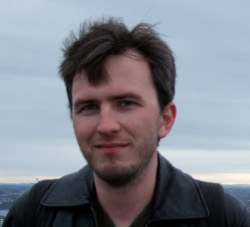In 2024, Joe assumed the chair of the editorial board of Historical Studies in the Natural Sciences. With Michael Barton and Greg Radick, he co-edited The Correspondence of John Tyndall, Volume 13 (Pittsburgh, 2024), covering the period of Tyndall’s lecture tour of the United States in 1872–73. Funded by a Royal Society APEX Award, he is currently conducting a project on the history of soft matter physics.
Joseph Martin

National Science Foundation Research Scholar
Industrial Patronage and the Cold War University
Science began to assume the central place it now holds in American society after World War II, when it drove the development of new consumer and military technologies and took a larger role in American politics and governance. Much of the research that directly affected Americans’ lives came from collaborations between universities and business interests. Historians who have investigated university-industry collaborations have shown how some of them supported American military interests during the Cold War. They have demonstrated, for instance, that institutions such as the Massachusetts Institute of Technology and Stanford University cultivated a cozy relationship with both industry and government after World War II, at times steering their research towards economic and military interests. Studies of this type of relationship have shaped current historical understanding of Cold War science, and they suggest that individual institutions possessed very little latitude to craft the types of relationships with industry they thought most conducive to their institutional goals. The project I am undertaking while in residence at the Consortium seeks to broaden this picture by investigating academia-industry collaborations that aimed to exclude pervasive military funding and find common ground between academic and industrial interests. A broader survey of institutions will situate existing understanding of academia-industry partnerships within a larger, knottier story about American science, technology, academia, and industry. These studies will help answer the questions of 1) the extent to which the motives driving industrial investment in science were contingent, and less rigid than is sometimes assumed, and 2) the degree to which individual institutions had agency to determine the shape and direction of their research programs and the character of their institutional partnerships.
Read more in the research report here.
Updates
In 2020, Joe Martin published Between Making and Knowing: Tools in the History of Materials Research, co-edited with Cyrus Mody; his article “The Simple and Courageous Course: Industrial Patronage of Basic Research at the University of Chicago, 1945–1953” appeared in the December issue of Isis; and he was elected a Fellow of the Royal Historical Society.
Joseph has accepted an Assistant Professorship in the Department of History, Durham University. His paper “When Condensed Matter Physics became Kingâ€_x009d_ appeared in Physics Today. He and his collaborator Agnes Bolinska were awarded the 2019 IUHPST Essay Prize for their paper “Negotiating History: Contingency, Canonicity, and Case Studies
Joe published Solid State Insurrection: How the Science of Substance Made American Physics Matter with University of Pittsburgh Press.
Joe recently published "Prestige Asymmetry in American Physics: Aspirations, Applications, and the Purloined Letter Effect," Science in Context 30, no. 4 (2017): 475-506. His book Solid State Insurrection: How the Science of Substance Made American Physics Matter appears this fall with the University of Pittsburgh Press.
has accepted a position as a teaching associate in the University of Cambridge Department of History and Philosophy of Science. His book, Solid State Insurrection, based on research he conducted as a Consortium predoctoral fellow, has been accepted for publication with the University of Pittsburgh Press.
Joseph has returned to the Consortium in 2016-17 as an NSF Research Scholar. In February 2016 he published an article in Physics Today, "The Peaceful Atom Comes to Campus," about the Michigan Memorial-Phoenix Project, a post-World War II nuclear research program at the University of Michigan that doubled as a war memorial. A special issue of Historical Studies in the Natural Sciences on new directions for history of the physical sciences, which Joseph co-edited with Amy Fisher, also appeared in June of this year.
Martin is currently in the History, Philosophy, and Sociology of Science unit at Lyman Briggs College, Michigan State University. Together with Michel Janssen, he co-edited a special issue of Historical Studies in the Natural Sciences, titled "Making the History of Physics Dirtier: Solid State Physics in the Twentieth Century," which appears in November 2015. He and Richard Bellon recently assumed the co-editorship of Endeavour and encourage submissions from friends of the Consortium.
Martin began a fixed-term Assistant Professorship at Lyman Briggs College, Michigan State University this year. His paper, "Is the Contingentist/Inevitabilist Debate a Matter of Degrees?" appeared in the December 2013 issue of Philosophy of Science. Three additional articles are slated to appear in 2015: "Evaluating Hidden Costs of Technological Change: Scaffolding, Agency, and Entrenchment" in Techné: Research in Philosophy and Technology; "What's in a Name Change? Solid State Physics, Condensed Matter Physics, and Materials Science," in Physics in Perspective; and "Fundamental Disputations: How Philosophical Debates Structured Solid State Physics" in Historical Studies in the Natural Sciences. Along with Michael Gordin of Princeton University, Joe is now co-convener of the Consortium's working group on the history of the physical sciences.
successfully defended his dissertation, "Solid Foundations: Structuring American Solid State Physics, 1939-1993" at the University of Minnesota this past May. He is now a Faculty Fellow in Science, Technology, and Society at Colby College.